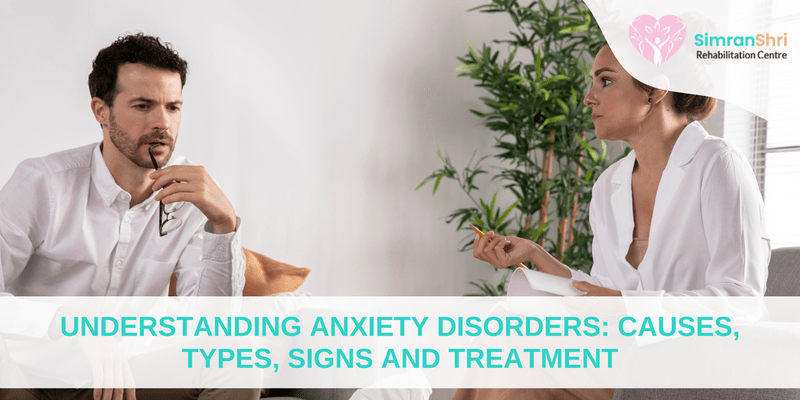

It's human to get rattled when taking a test, starting a job, or moving to a new place. Notwithstanding its unpleasant nature, it still motivates individuals to work harder or strive to do better. Ordinary anxiety is situational; it comes and fades away but never interferes with one's day-to-day life. In the case of anxiety, the overwhelming fear and worry might never fade away at any time of the day. It is intense and often debilitating.
This type of anxiety stops one from doing things one enjoys. In certain cases, one might avoid entering the elevator, crossing the road, or refusing to leave their house. If left untreated, the anxiety might get worse.
Anxiety disorders are the most commonly occurring emotional disorders that one can struggle with at any age. It is the most common comorbid illness of substance use disorders. According to the APA, women are more likely to be diagnosed with an anxiety disorder than men.

Anxiety disorder can be due to the following-
● Genetics - Anxiety disorders can also run in the genes.
● Brain chemistry - Research suggests that some brain structures are more prone to anxiety disorders than others.
● Environmental stress- Individuals' stressful situations or events can also cause anxiety. Experiences such as losing a loved one, childhood neglect or abuse, being a part of a brawl etc.
● Drug withdrawal - symptoms of depression and anxiety are closely linked with substance use disorder. Drug intake can reduce or conceal anxiety symptoms.
● Medical conditions - Certain lung, heart or thyroid conditions can result in anxiety-like symptoms or worsen anxiety symptoms. It's important to go for a full body diagnosis to rule out medical conditions when getting treatment for anxiety.
The following are the several types of anxiety disorders -
● Generalized anxiety disorder - Persistent and excessive worry even without reason impairs one's day-to-day function.
● Panic disorder - one might experience panic attacks - profuse sweating, chest pain, and palpitations. One might feel that they are choking or experiencing a heart attack.
● Social anxiety disorder - Overwhelmed with fear and worry in social settings wherein individuals feel others are judging them or might embarrass themselves or get ridiculed.
● Phobias - intense fear of an object or situation such as fire or dogs. This fear makes one avoid problems where they can come across their worries. Even pictures or descriptions of these situations or objects cause anxiety symptoms.
● Separation anxiety - Not just Children but individuals of all age groups can suffer from separation anxiety. They fear losing their loved ones and get worried as soon as they are away from their sight. One often worries that something bad might happen to their loved ones.
Anxiety disorder symptoms can make breathing, sleeping, staying still and concentrating difficult. Symptoms may vary across specific disorders. Some signs commonly felt across all types include:
● Experiencing panic, danger or doom
● Inability to stay still or calm or concentrate
● Shortness of breath or breathing fast
● Palpitations
● Nausea
● Dizziness
● Avoiding feared situations or places
● Sleep problems
● Cold, numb or sweating limbs
● Dry mouth
● Tense muscle
● Inability to stop thinking about something (rumination)
If you or your loved ones struggle with these symptoms, you should seek the best anxiety disorder treatment.
Once a mental assessment has determined your anxiety level, you can explore the Best Mental Health Counseling Services and medications that suit your symptoms and underlying triggers. For subclinical or mild anxiety levels, medical treatment might not be required; lifestyle changes and healthy coping skills would make a difference. In severe or moderate anxiety levels, a combination of medications and psychotherapy is needed to cope with the symptoms and make day-to-day life manageable.
Psychologists can help you learn healthy coping skills and strategies via Best Stress Management Counselling to manage anxiety. At the same time, medications commonly used in anxiety disorders include antidepressants and sedatives. These help ward off severe anxiety symptoms, prevent episodes of anxiety and balance the brain chemistry.
Anxiety is highly treatable; all it takes is the first step to approach a mental health professional. Don't waste another day succumbing to the worries and fears deteriorating your health. No matter big or small, all your worries need to be addressed. You deserve a dauntless, happier and healthier life.